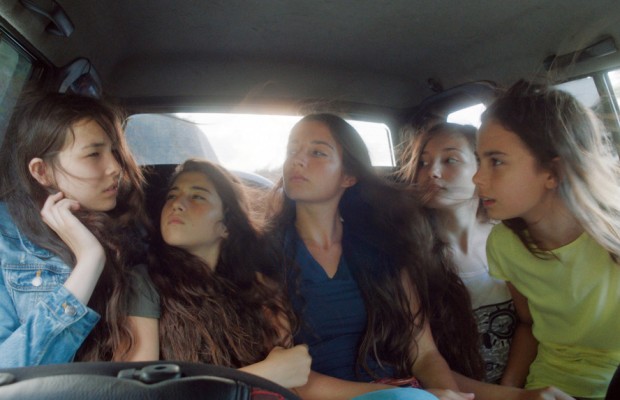AFI FEST REVIEW: Oppressed Sisters Fight For Autonomy In “Mustang”

“Mustang,” the debut film from director Deniz Gamze Erguven, sounds like it should be about a wild untamed horse, and while in reality it follows five young sisters, in many ways the title is the perfect description for the defiance and spirit the girls show towards their repressive world.
The orphaned girls are being raised in a strict community by their grandmother and uncle in Northern Turkey. The film opens on the last day of school, as the five girls bid tearful goodbyes to a teacher moving to Istanbul. As the day comes to a close the girls decide to take the long way home so they can run through the beach and celebrate with their classmates. When innocent piggy back games are mistaken for inappropriate behavior by a neighbor, however, their playful world is shattered. In the words of youngest sister Lale (Günes Sensoy), “everything turned to shit.”
Their scandalized neighbor accuses the girls of pleasuring themselves on the shoulders of their male classmate and grandmother in turn, sends them to be examined by a doctor to prove their virginity. Things only get worse from there when their uncle beats them for acting like whores and removes anything that might “pervert them” from the house. All make-up, computers, and telephones get locked away as the first step in an isolation that gradually ramps up as the film progresses.
The girls are forced into shapeless brown dresses while a parade of aunts comes through the house, in a non-stop Home Ec workshop that Lale’s voiceover refers to as a “wife factory.” After the girls sneak out of the house together to attend an all-female football match, the wedding plans intensify and the two oldest sisters, Sonay (Ilayda Akdogan) and Selma (Tugba Sunguroglu) are married off in a double ceremony. While the remaining sisters continue without the older two, it is revealed that Uncle Erol is molesting Ece (Elit Iscan), and after a period of behavior Lale refers to as “dangerous” Ece unexpectedly kills herself. With only Nur (Doga Zeynep Doguslu) and Lale left in the house, Nur becomes the next in line to be married off. The night of the wedding Lale takes a stand, staging an escape that leads both Lale and Nur to Istanbul where they are reunited with their teacher.
The “Virgin Suicides” comparison is inevitable, as much for the premise as for the details of the film itself. The dreamy cinematography of the opening scenes echoes “The Virgin Suicides,” though in this film the girls aren’t seen through anyone else’s lens. Instead the audience sees them as they are—teenage girls. “Mustang’s” tone abstains from wispy meditation and instead gives a direct and naturalistic narrative that laments the girls’ woes while also celebrating their rebellion in the face of a repressive environment.
The title reflects the girl’s collective spirit. The sisters find a way to break past every roadblock their family sets in their way, continuing to do things on their own terms. Though Sonay and Selma are pushed into marriage, Sonay negotiates with her grandmother and happily marries her boyfriend. Ece’s suicide functions as her choice not to participate in the life her family has laid out for her, and Nur and Lale choose to run away. Of the five, only Selma concedes to a life she doesn’t want.
The film masterfully depicts simultaneously both the prison that patriarchal values create and the power within each individual to subvert the system.
“Mustang” is now playing in limited release.
Written By: Deniz Gamze Erguven & Alice Winocour
Directed By: Deniz Gamze Erguven
Starring: Günes Sensoy, Ilayda Akdogan, Tugba Sunguroglu, Elit Iscan, & Doga Zeynep Doguslu
Grade: A



